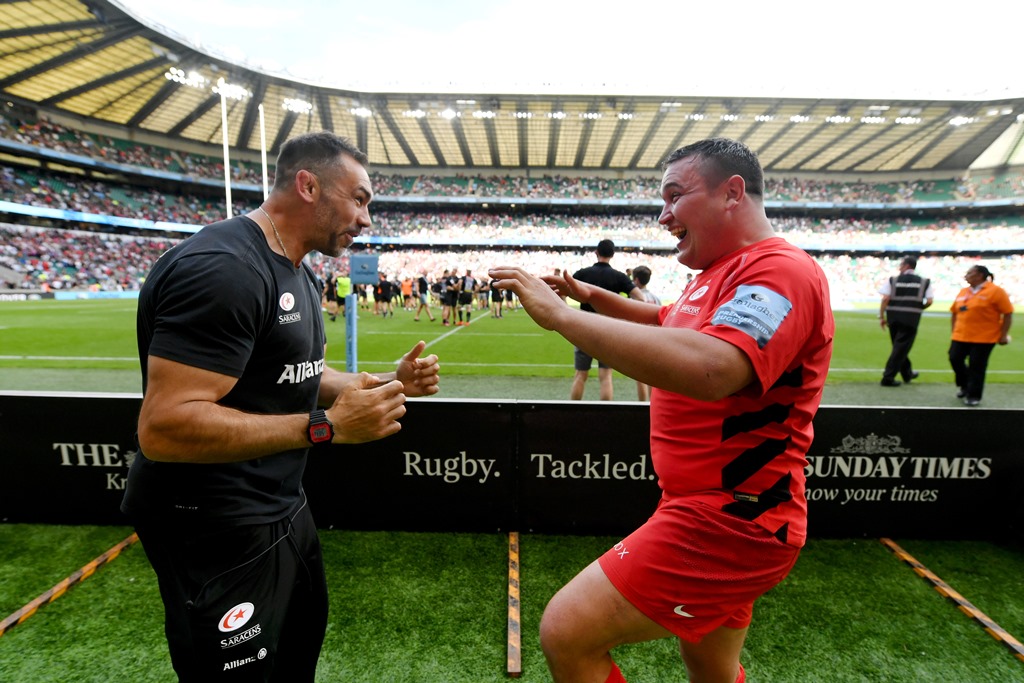
ALEX Sanderson says Saracens are going through the season from hell, in which the inferno engulfing the club has come in waves, but that they will endure the heat and forge a new destiny.
Sanderson, the 40-year-old Saracens forwards/defence coach who is one of the brightest coaching talents in not just the English game, but globally, says that no sooner has the club put out one fire than another has started.
First it was an unprecedented £5.36m fine and 35-point deduction for salary cap infractions in November. Then, in January, the blaze of recriminations continued with the announcement by PRL, and its ‘owners group’, that the double-winning Premiership and European champions would be relegated.
And now, like the rest of the game, Saracens are having to cope with the potentially crippling blast from the coronavirus suspension of the season.
Flames are all around, most notably in attempts to plunder the club by picking off star players like Maro Itoje and the Vunipola brothers, yet Sanderson refuses to press the panic button.
“It’s been a very tough season, both physically and mentally, with us having to adapt to one set of circumstances, only to find that those have changed, and that we have another set to deal with. Now with the virus we have had to reset again, along with everybody else this time, which makes it our third big adjustment of the season.”
Saracens had been hit hard so hard financially by the fine that most clubs would have gone up in smoke already. Pile on the lack of gate money and hospitality packages, and it should have seen the club vapourised.
However, for those rival Premiership owners hoping to see the club torched, the Sanderson message is that Saracens are still standing– but not standing still.
To start with, the damage limitation in terms of keeping the core of the squad together in the Championship is looking good. England stars Owen Farrell, Jamie George, Mako and Billy Vunipola and Elliot Daly are staying, along with club stalwarts like Alex Goode, Jackson Wray and Richard Barrington – and Springbok tight-head Vincent Koch is mulling over the Championship option.
Sanderson says that Itoje, who’s outstanding Six Nations form cemented his reputation as one of the best forwards in the world – and one of the most sought-after – is also weighing-up the pros and cons of spending a season in the second tier.
He reveals that the Saracens coaching staff have divided the squad between them during the training lockdown, taking six players each, with a view to improving the communication between players and coaches, and that Itoje, “is one of the guys I’m calling”.
Sanderson says: “Maro doesn’t like people talking about him, because he can speak for himself, but if you ask me from my opinion, I hope he does stay with us next season.”
He maps out his prefered solution: “Realistically, Maro might play six games for us in the Championship, and the rest will be international commitments. What it offers him is the best strength and conditioning coach in the world in Phil Morrow, and the structure where he could be like a centrally contracted player, where he plays 20 games a season, and then goes into the 2021 Lions tour in the best physical and mental state of his career.”
However, Sanderson understands why, having been approached by Racing, Itoje is attracted by playing a season in the Top 14.
“Maro is one of those players who is highly motivated to be at the highest level all the time, constantly striving to be better, to be the best lock in the world. So, I can understand the attraction of a club like Racing alongside so many exceptional players.”
“Maybe this enforced period of reflection will give him the time to work out what’s best for him.”
Sanderson says that irrespective of Itoje’s decision, he finds him a stimulating character to be around because of his desire to push the performance boundaries ever further.
“I’ve recently been doing some research into Dan Gable, the American Olympic wrestler with the most phenomenal record in the sport. He was seven years undefeated in college, until he lost his last match, leaving him with a 117-1 record. Gable said that single defeat pushed him to the summit, and he won gold at the 1972 Munich Olympics.
“I will be sending the link to Maro, because Gable thought about that one loss in the same way as Maro has talked about England’s World Cup final defeat. That adversity has accelerated his development faster than anything. The loss has pushed him on to be better in himself, and therefore better prepared to help his team win.
“Maro is introspective, in the sense that he knows what drives him, and what he needs to do mentally and physically to come to the game in the right space. It is an individual responsibility, which he understands very well.
“He’s a genius of a player in what he can do, and my job is to suggest ideas that might help him further. In many ways when I talk to him it’s a mutual mentoring for me as a coach.”
He adds: “A lot of the best players carry a bit of (mental) weight, in that they think more than the average player, and are harder to manage. Our best players are the ones who challenge you most. With some players if I say jump they say ‘how high’? With others they say ‘why’?”
Sanderson dismisses the rumour that the Vunipolas are being sought by Super Rugby. “That’s the first I’ve heard of it. What I’ve been told is that they will be with us next season, and are included in our squad.”
Sanderson’s ability to combine realism with an unflinchingly positive mindset is what makes him such a powerful motivational force for Saracens.
Sanderson says Saracens will be going into the Championship at full tilt, and could seek to give the second tier the mutual benefit of a higher profile by arranging big showpiece matches, including a possible World Club final against the Crusaders, the New Zealand Super Rugby champions.
“We’ve got a good relationship with the Crusaders, and we’d love to have something like a World Club final against them at Wembley. I’d love it as a coach, and it would be good for the game overall to get the exposure.”
Sanderson argues that he does not want Saracens to get a reprieve on their relegation sentence if the current financial circumstances force another Premiership club to go bust.
“It wasn’t handled well by us at the start of the season, but when, as coaches, we learned what happened we held our hands up. Given the extraordinary circumstances, it could be that we stay up due to another club going into administration, and we don’t want that. We don’t want to work from a place of bitterness, and we should accept we were not hard done by, deserved our punishment, and must now rebuild.
“What we will take into the Championship is the mentality that we want to enjoy it, and although that has always been our way, sometimes over the last eight years we have been on the treadmill to win.
“Due to our internationals and the restricted number of games they can play, we will plan for them to get game time when necessary to fit in with the schedule they have.
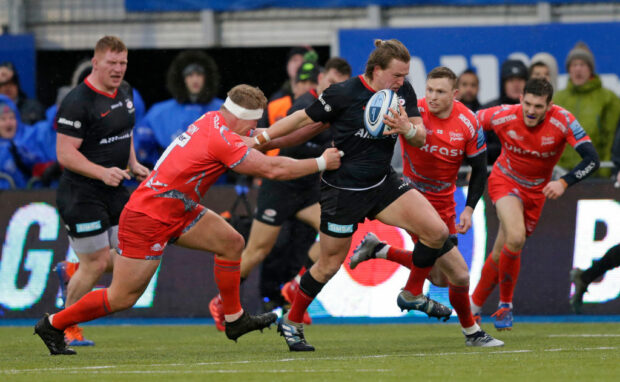
“The core of the squad in the Championship will be young players. In the pack, Tom Woolstencroft is one of the most physical hookers in the league, and Callum Hunter-Hill and Joel Kpoku can be as good as George Kruis. In the back row Andy Christie and Sean Reffel were excellent against Leicester recently, and this gives us a year where they can grow without the results pressure you get in the Premiership.”
Sanderson’s glass half-full outlook is reflected in his approach to the raft of next generation Saracens players who are taking up one-year loan contracts with other clubs, mainly Premiership.
Ben Earl and Max Malins will spend a season with Bristol, Nick Isiekwe with Sale or Gloucester, and Alex Lozowski with Toulouse.
Ask Sanderson if he expects to see all the loan players return and he is optimistic, but also pragmatic.
“It’s always the risk if you send them to another good environment, like Bristol. But for the most part we back ourselves for them to want to come back– and there are strong signs that they will, but we’ll see.
“We feel that a lot of our success has been based on our emphasis on personal development, and all the support systems we have in terms of strength and conditioning, nutrition, career opportunities, and a genuine squad and community bond, rather than being just about salaries.”
Sanderson is phlegmatic about players leaving, including England duo Kruis (Japanese Top League) and Ben Spencer (Bath), Welsh internationals Liam Williams (Scarlets), Nick Tompkins and Rhys Carre, Scotland wing Sean Maitland (Glasgow/Edinburgh), Wallaby lock Will Skelton, and USA tighthead Titi Lamositele (Montpellier).
“There are a few who have made decisions for their careers, and although we put years into bringing on players like Ben Spencer and Titi Lamositele we wish them well.”
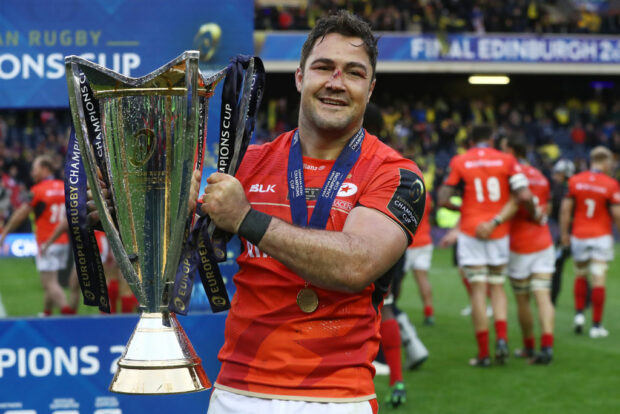
However, Sanderson intimates that the biggest loss of all could be the club’s rock-like captain and inside centre Brad Barritt, who has been a huge influence over the last decade.
“The last time I spoke to Brad he didn’t want to finish his career playing in the Championship, and it is sad that a player who has been so important to us will probably not have the chance to have a testimonial season.
“However, he has business plans and family back in South Africa, so all that has happened this season has rocket-blasted Brad into making decisions about his future.”
Sanderson elaborates: “It is uncertain times, in which there might have to be some staff redundancies. As it stands, all coaches and players in the Premiership have taken a 25 per cent pay cut, and players will inevitably be considering their futures.
“We know that George Kruis is going to Japan, and we don’t know if he will be back. All I can tell you is that Schalk Burger was in Japan, and he decided that he wanted to finish his career with Saracens because he enjoyed being at the club.
“There is an idea that players come to us to be on more money, but Jim Hamilton and Juan Figallo came to us from Montpellier, and were on less money. But they understood that the trade-off is that we look after our players, and rotate them, and therefore they know their shelf-life is longer.”
Sanderson’s belief in the Saracens way is unshakable, despite his admission that his club got things badly wrong in their administration.
“Some of the results we have had this season, whether in the Premiership or Europe – such as the wins over Gloucester and Racing – will go down as some of our greatest games for me, because of the fight we showed when everything else was going wrong.
“What happened to the players was none of their fault, and yet they stood up, despite having another kick in the balls, another thing taken away. There was no bigger challenge than rising above it and honouring the standards players like Brad Barritt and Richard Wigglesworth have helped to establish.”
He also points to the last four weeks of Premiership matches before the suspension as a yardstick of the squad’s character.
“When you look at the stuffing we gave Sale at home, and then the way we were stuffed by Wasps, and then beat Northampton – when things weren’t always going our way – it proved to us that it is about how we pull together, and set our own standards despite any obstacles, that matters most.”
Inspirational coaches are also priceless, especially in times of uncertainty, and it is why it is a safe bet that with Alex Sanderson as a driving force, Saracens will be back.
The latest edition of The Rugby Paper is only a few clicks away from being at your fingertips
— The Rugby Paper (@TheRugbyPaper) March 31, 2020
Get the digital edition to access our extensive archive and relive the drama of the sport from years past
➡️https://t.co/JBInhKR2ES pic.twitter.com/FHMMYfWqZG





















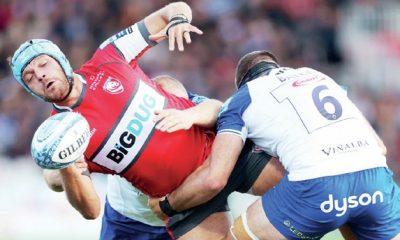

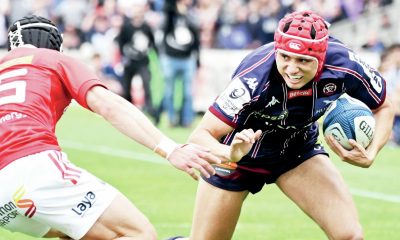



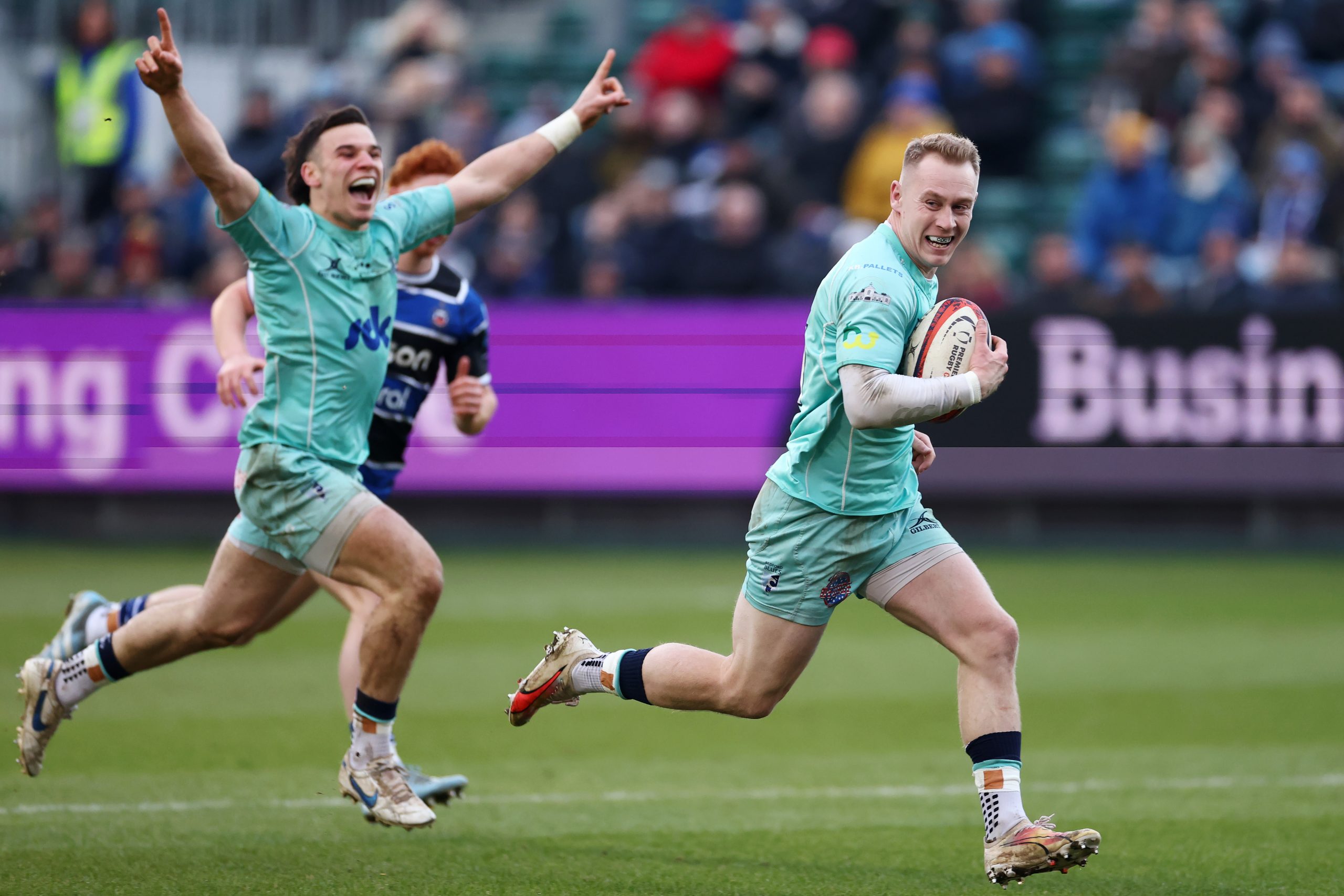
You must be logged in to post a comment Login